Change is happening too fast… and too slowly
See the full data and methodology.
Programming note: Welcome to the first non-pandemic issue of the tracker formerly known as the “coronavirus tracker.” As the government has now declared an end to the public health emergency, we are effectively mothballed the Ipsos Pandemic Adaptation Continuum. The IPAC served us well these past three years, but the data showed us it was time to move on and free up space for some deeper dives on other topics. Enjoy.
Here’s what we know today from the Ipsos Consumer Tracker:
- 86% say they feel their savings are safe at their bank, unchanged from W72 in March
- 46% prefer ordering food online for takeout or delivery rather than speaking to a person (38%)
- Only 19% were familiar with an announcement by IBM to pause hiring of jobs that AI could do, but 63% cared
- 52% say they are concerned about having AI used to help target advertising to shoppers, a big bump (9 points) from W72 in late March. The rest of the battery was unchanged.
Read on for data about AI, ordering takeout, the pace of change, and how much we care about the day’s news.
Change is happening too fast… and too slowly
Why we asked: Ferris Bueller, on his famous Day Off, said that “Life moves pretty fast. If you don't stop and look around once in a while, you could miss it.” But is it moving too fast?
What we found: We asked about several issues in the news today: gender identity, AI, climate change, and gun control legislation. Overall, people were more likely to say that the conversation around gender identity (48%) and the development of AI (46%) are moving too fast, and climate change (40%) and gun control (53%) are happening too slowly. There were some significant party splits on each of these contentious topics, including AI, which Republicans were 10pts more likely to say was happening too fast. In no case does a plurality think chance is happening at the correct speed.
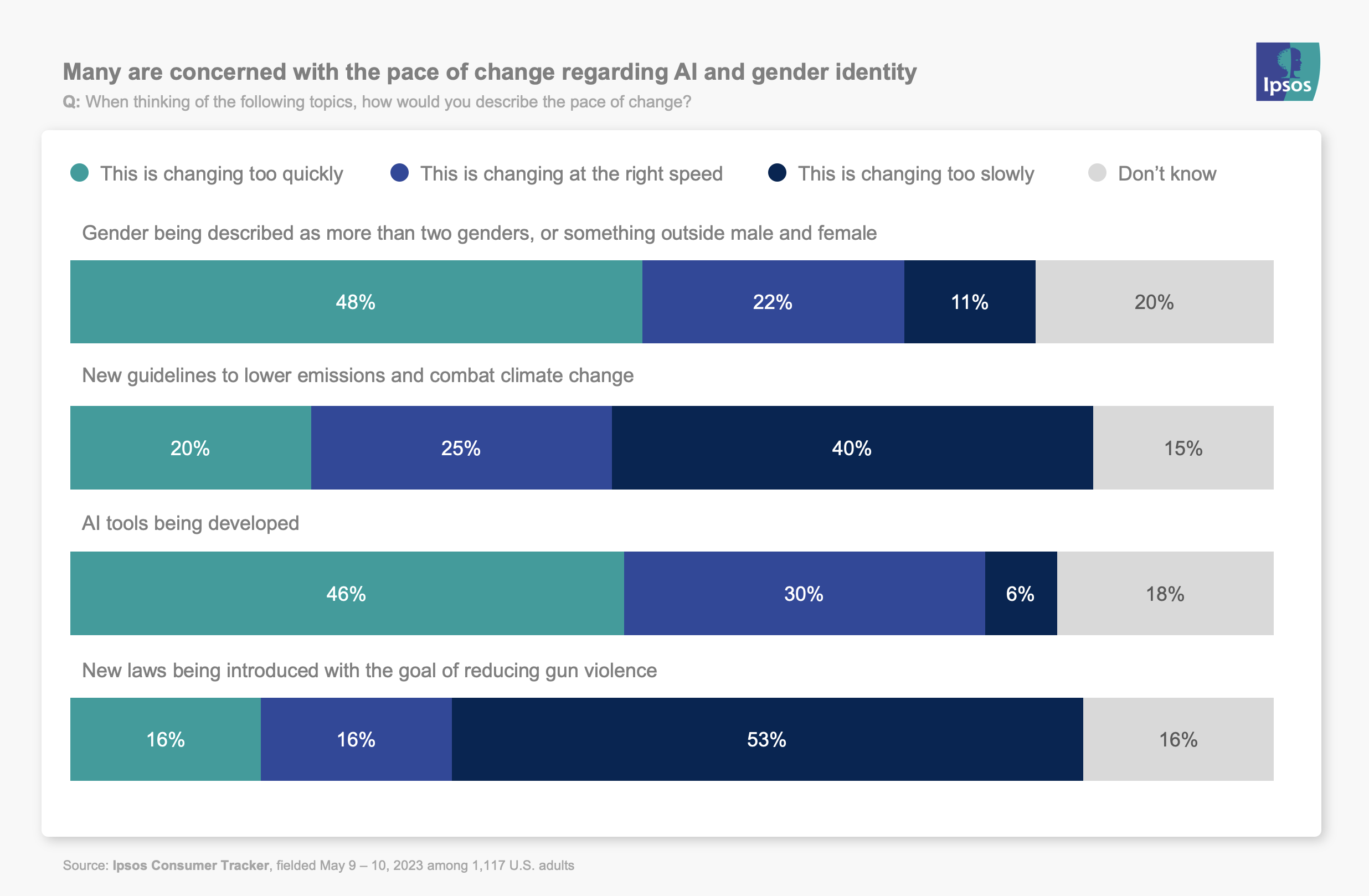
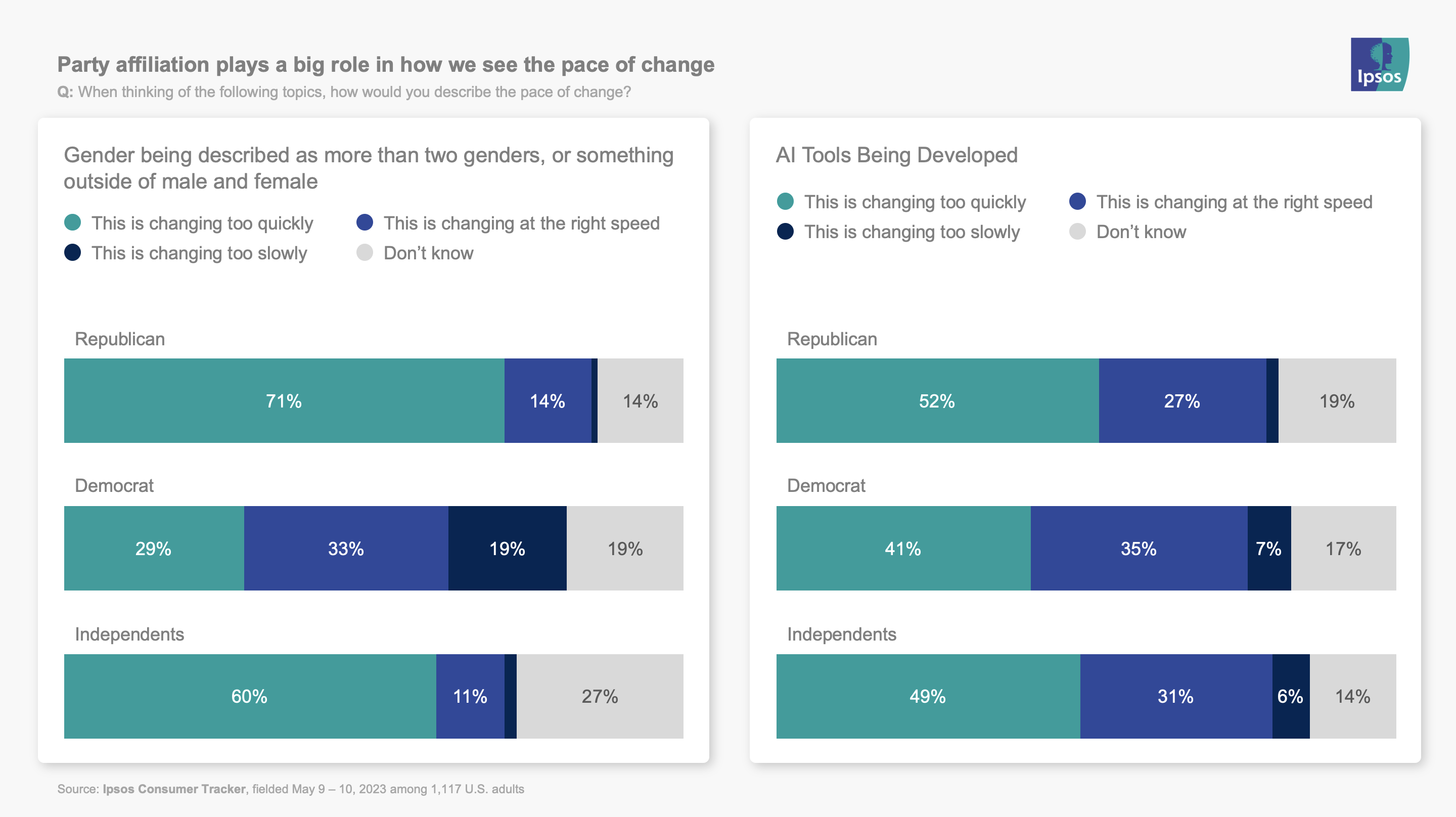
How comfortable are we with AI tasks? Depends on the task
Why we asked: We’ve asked about AI doing some of these tasks before. Now, the Hollywood screenwriters have gone on strike and one of the issues in their contracts is how AI can be used to essentially do their jobs. How do people feel about this, generally?
What we found: It really depends on the task we asked about. People are generally more uncomfortable than comfortable with AI doing tasks previously done by humans, exceptions are assessing cyber security threats and generally “analyzing data to help companies make decisions.” The biggest differential between the comfortable and not are in the realm of entertainment: creating video or audio in the likeness of actual living humans, or creating realistic sports content like AI tennis matches. People were more or less evenly split on having AI write scripts for movies or TV, perhaps proving that the screenwriters have a point.
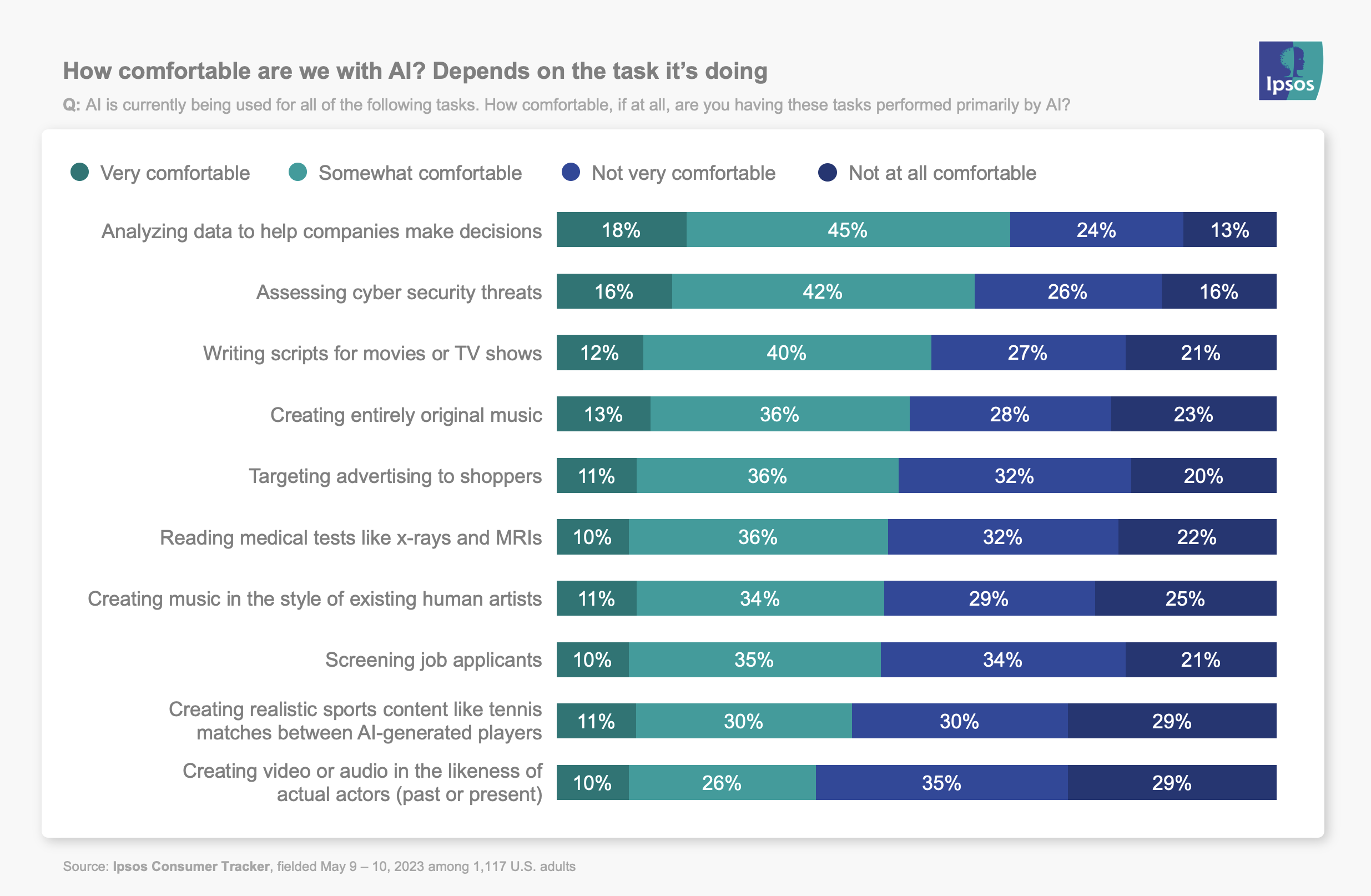
People have concerns about ordering food for delivery and take out
Why we asked: Some Millennial colleagues were discussing why they prefer going into quick serve restaurants and ordering takeout to ordering online or at a drive-thru. Which leads me Another Gen-X movie reference, but we can’t resist. In "Lethal Weapon 2," Joe Pesci’s character goes off on a colorful rant about the drive-thru. [Editor’s note: This happened to me this weekend, if I had wanted sauce, I would have asked for sauce, not “no sauce.”] So we thought we’d see if others agreed with their concerns.
What we found: Yes, there’s widespread concern. First, we asked about ordering preferences. 46% prefer ordering food online for takeout or delivery rather than speaking to a person (38%). In the follow-up we found that people are concerned (often with high levels of “very concerned”) about everything from having your order be partially (76%) or entirely wrong (64%), cold (74%) or late (64%). A majority (53%) are even suspicious that they’ll get smaller portions than if they ate in-person, which is the specific topic that started this thread with my coworkers. There are obvious implications for customer experience and loyalty, packaging (re: cold food) and especially marketing.
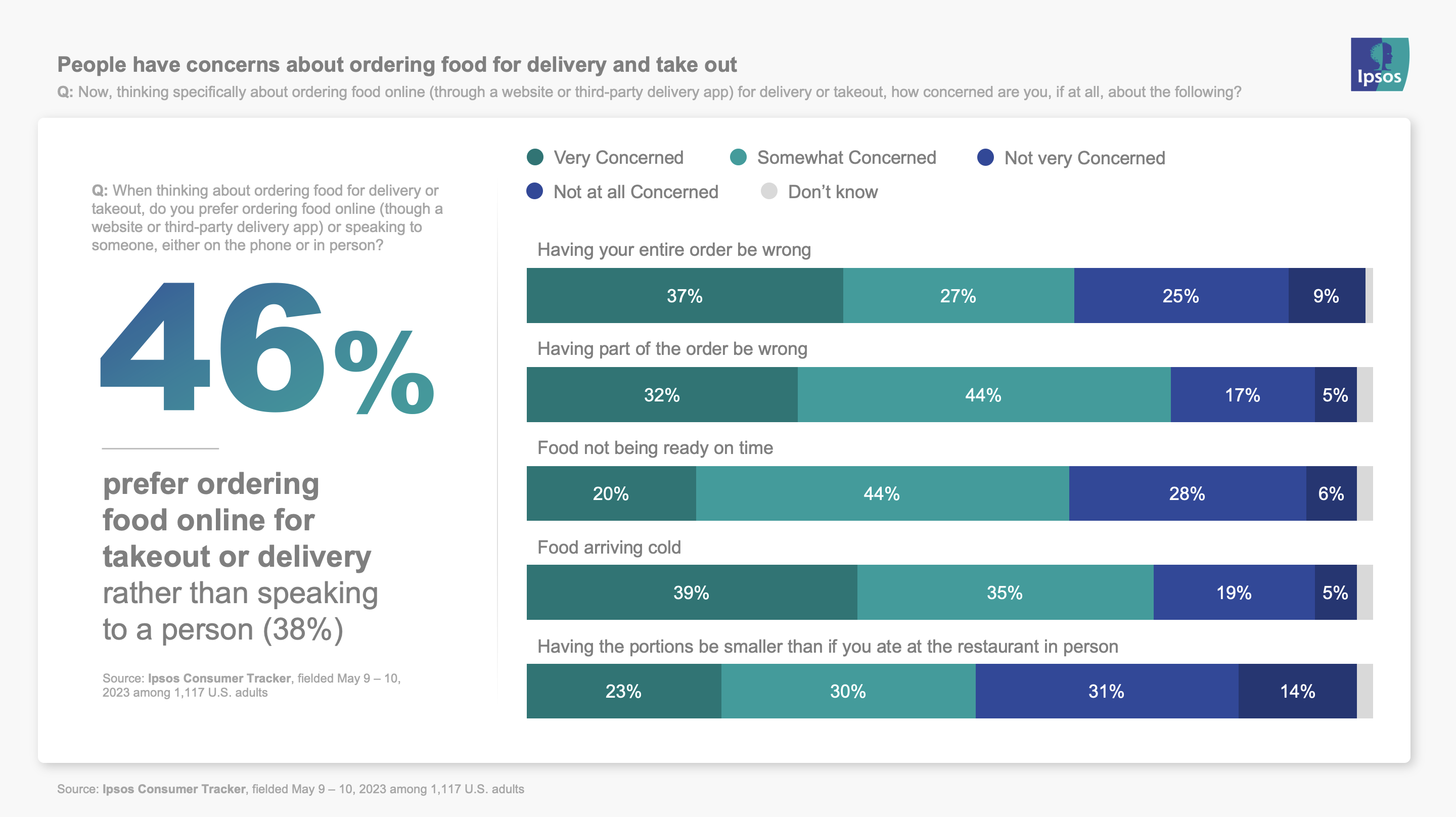
The Care-o-Meter (Week of May 8, 2023)
Why we asked: We had amazing response to the Care-o-Meter’s debut last wave so we are not only keeping it going, we’re expanding and evolving it including a new quadrant chart format from Matthew Alward, our TrackerCharter™. Here’s the nutshell from last wave: Every day, we are bombarded with news and information. Some is of the utmost importance in the short-term or long-term. Some is frivolous. Regardless, we make a million decisions in our own personal taxonomy of how much we are going to care about All the Things. We decided to start measuring this with our new feature: The Care-o-Meter. This will take a pulse of the zeitgeist and also how much of a bubble we are in. It’s a simple pair of questions: How much do you know about a series of in-the-news events, and how much do you care about them.
What we found: Taking 50% know or care as our center point, we have broken this into four quadrants: Know/Care, Know/Don’t Care, Don’t Know/Care, Don’t Know/Don’t Care. This wave, alone in the Don’t Know/Don’t Care area we have Don Lemon’s departure from CNN (Democrats cared slightly more) but Tucker Carlson’s rift with Fox is in the Know/Don’t Care quadrant (Republicans cared more) along with the coronation of King Charles III. We know and care about the writer’s strike, the debt ceiling negotiations, rising interest rates and the rise of AI. And we don’t know, but care about, Montana passing laws restricting gender-affirming care for minors, the failure of First Republic Bank, and a prominent AI researcher sounding an alarm about the technology.
The big outlier was also an AI story as IBM announced it would pause hiring for jobs that it thought AI could do instead. Few (19%) had heard of this story, but 63% decided they care! Which is part of the beauty of the Care-o-Meter. Once we know about things, even perhaps just from the survey (or you see it in your social feed, or whatever) you can quickly have an opinion and even a strong one.
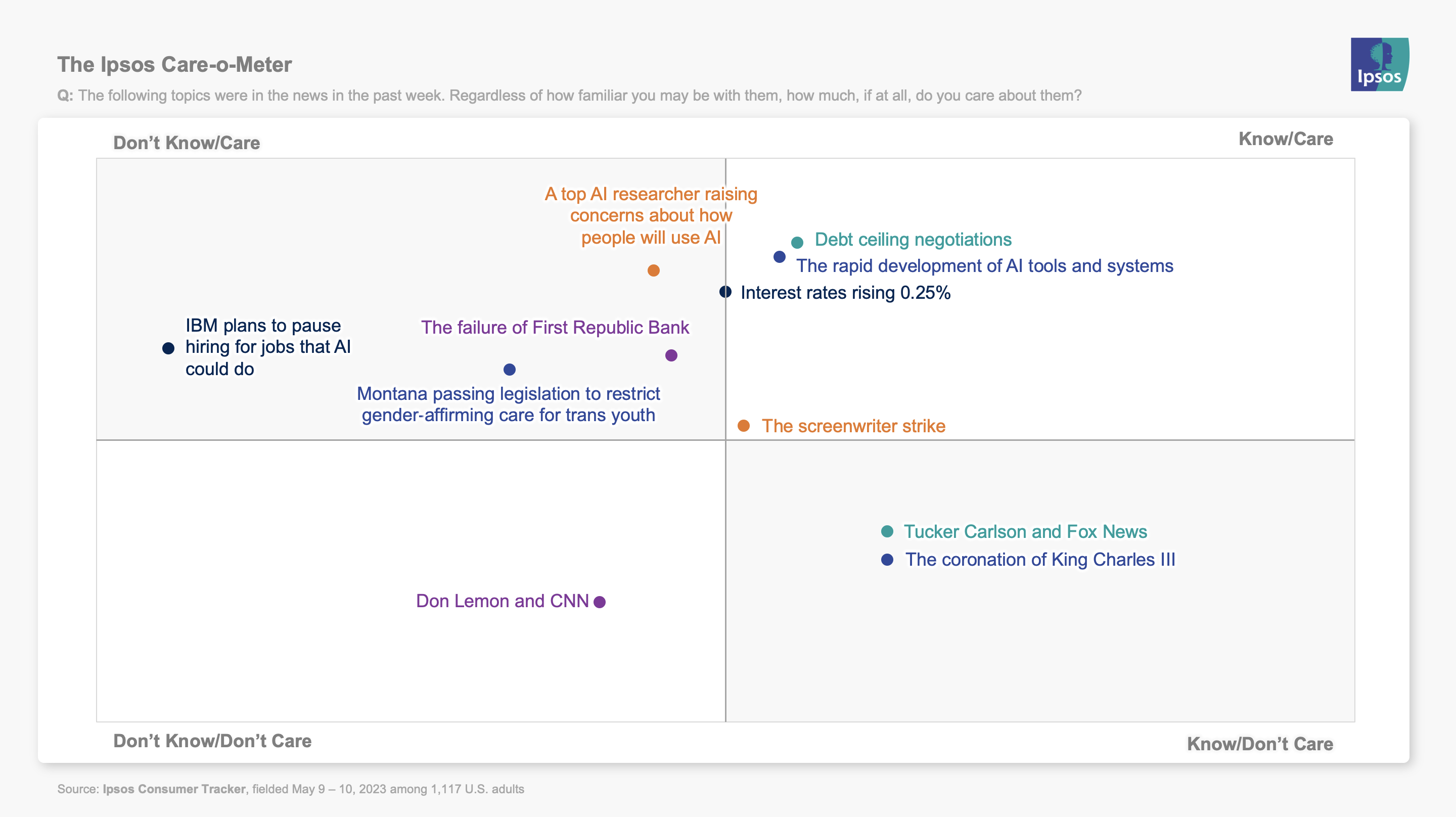
Signals
Here’s what we’re reading this week that has us thinking about the future.
- IBM to Pause Hiring for Jobs That AI Could Do (via Bloomberg)
- Suns ditch Ballys Sports Arizona (via BizJournals)
- GOP releases GAI Biden attack ad (via Gizmodo)
- KPMG spins out new AI security company (Accounting Today)
For complete toplines for all waves, please see the full data and methodology.


